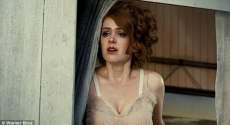
The subtle comparison between Myrtle and her sister is a clever yet easy way to create some sympathy towards Myrtle, particularly as it is very easy to relate to in any society; most people feel inferior to a sibling at some time. Myrtle is said to be with ‘no facet or gleam of beauty,’ whereas Myrtle herself says her sister is; ‘said to be very beautiful by people who ought to know.’ However, it is easy to detect Myrtle’s feelings of inferiority as she cannot even bring herself to say simply that her sister is beautiful, she only infers it as an opinion from others. Catherine is also described as ‘slender’ which is a complete juxtaposition to ‘stout,’ so it is clear that Catherine seems to fit the typical ideals of beauty more readily than Myrtle. This could create sympathy towards Myrtle quite effectively, as she would be seen as the less attractive of the two, yet equally, the reader may feel some resentment towards Myrtle as, she cannot bring herself to be genuinely complimentary to her sister; perhaps she is simply jealous?
Myrtle may appear to be victimised by Tom in some ways, and deserving of sympathy, yet, she can be quite manipulative of Tom, with no apparent reservations; Myrtle sees some dogs in a shop and desires one, almost instantaneously inquiring, ‘how much is it?’ knowing full well that she herself, would not be spending any money on it. Not only that, but her main justification for wanting a dog, is because she thinks it is ‘cute,’ which is again, extremely superficial. Subsequently, the dog is never mentioned later in the novel, suggesting that it has lost its immediate aesthetic appeal, so as readers, we assume that the dog must die as it is never said to be cared for. Such a casual attitude to another creature’s life may cause the reader to feel disgust towards Myrtle, particularly as she took advantage to attain the dog in the first place. This is a very effective way of presenting Myrtle, as it really shows her in a different light, and reminds the reader that, to some extent, Myrtle does have power, even though she is female, and regarded less highly, and even though she is a mistress; Myrtle is not entirely a victim.
Throughout chapter two, Myrtle changes her outfit numerous times; ‘she had changed her dress to a brown figured muslin,’ ‘Mrs Wilson had changed her costume sometime before.’ The fact that her outfit is referred to as a ‘costume,’ in itself suggests that Myrtle is playing a part; she seems to be working very hard, fulfilling the part of the trophy girlfriend, so that Tom will stay with her. Her desperation could create sympathy as, evidently she is scared of losing Tom, yet it is debatable as to whether this is because she loves him, or because she has no wish to relinquish her luxurious lifestyle. As it could easily be the latter, the reader may be doubtful of her motives, and view her as entirely selfish and superficial. Fitzgerald effectively uses Myrtle, along with other characters, to portray the idea that the American dream was being dramatically misinterpreted; the original American dream was the hope that, of a person worked long and hard enough, they would eventually have their own land and home, where they could live happily, but as seen in ‘The Great Gatsby,’ the dream seems to be distorted to one of materialism. Myrtle’s constant outfit changing might not be viewed purely as insecurity, but also as her shared wealth with Tom, and perhaps a materialistic nature; she now seems to have acquired the perfect life in some aspects, but she is not truly happy.
Image: http://quotesgram.com/quotes-about-myrtle-great-gatsby/

0 Comment:
Be the first one to comment on this article.